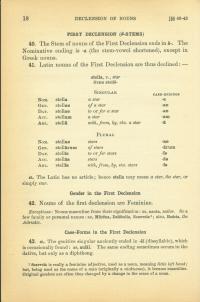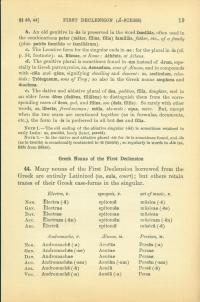43.a. The genitive singular anciently ended in -āī (dissyllabic), which is occasionally found, as in aulāī. The same ending sometimes occurs in the dative, but only as a diphthong.
b. An old genitive in -ās is preserved in the word familiās, often used in the combinations pater (māter, fīlius, fīlia) familiās, father, etc., of a family (plur. patrēs familiās or familiārum).
c. The locative form for the singular ends in -ae; for the plural in -īs (cf. § 80, footnote):
Rōmae at Rome
Athēnīs at Athens
d. The genitive plural is sometimes found in -um instead of -ārum, especially in Greek patronymics (Aeneadum, sons of Æneas), and in compounds with -cŏla and -gĕna, signifying dwelling and descent:
caelicolum celestials
Trōiugenum sons of Troy
So also in the Greek nouns amphora and drachma.
e. The dative and ablative plural of dea, goddess and fīlia, daughter, end in an older form -ābus (deābus, fīliābus) to distinguish them from the corresponding cases of deus, god, and fīlius, son (deīs, fīliīs). So rarely with other words,
līberta freed-woman
mūla she-mule
equa mare
But, except when the two sexes are mentioned together (as in formulas, documents, etc.), the form in -īs is preferred in all but dea and fīlia.
Note 1— The old ending of the Ablative singular (-ād) is sometimes retained in early Latin.
praidād booty (later, praedā)
Note 2— In the dative and ablative plural -eis for -īs is sometimes found, and -iīs (as in taeniīs) is occasionally contracted to -īs (taenīs); so regularly in words in -âia (Bâīs, from Bâiae).


